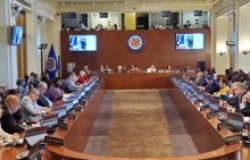Mexican President Calderon's State Visit to Washington: Prospects for Mexico and U.S.-Mexico Relations
Denise Dresser, Professor, ITAMand Columnist, Reforma; Juan Pardinas, Director of Finance, Mexican Institute for Competitiveness and Columnist, Reforma; David Shirk, Director, Transborder Institute, University of San Diego and Fellow, Woodrow Wilson Center; Shannon O'Neil, Douglas Dillon Fellow for Latin America, Council on Foreign Relations; Andrew Selee, Director, Mexico Institute, Woodrow Wilson Center
Overview
The video of this event can be viewed on the C-SPAN website.
What does the future hold for U.S.-Mexico relations following Mexican President Felipe Calderon's recent state visit to Washington? Analysts from Mexico and the United States addressed this question at a Mexico Institute-sponsored panel discussion, generally agreeing on the challenges facing the country but dividing on outlooks for the future.
A Return to the Past
 Denise Dresser, professor, ITAM; columnist, Reforma
Denise Dresser, professor, ITAM; columnist, Reforma
Offering a pessimistic assessment, Dresser said Mexico could be forced to take a step backward if, as expected, the historically dominant PRI party wins the 2012 presidential election. A victory by the PRI would signal a mediocre near-term for Mexico, she said. "It means that Mexico will continue to muddle through," moving laterally and not advancing. A PRI win would signal an anti-democratic turn because the party will resort to patronage and clientelism to govern, she said. A PRI president would be beholden to a coalition dominated by oligarchic interests with a strong populist-nationalist identity, she suggested.
The "putinization" of Mexico explains why the PRI is expected to retake the presidency—after its ouster in 2000 following 71 years in office. Public security fears amid rampant drug violence, combined with voters' acknowledgement of the PRI's experience at governing, are driving support, she indicated. The PRI, whose initials stand for Partido Revolucionario Institucional (Institutional Revolutionary Party), is also poised to dominate this summer's gubernatorial races—important for establishing control over state elections machinery, she said.
Dresser blamed the other parties with putting Mexico on the brink of a "potential political regression," i.e., a PRI presidential victory. She cited the "collapse" of the internally divided Mexican Left with impeding the formation of an effective counterweight to the PRI, adding that the Left had "no chance" of winning the presidency. She also noted the "administrative inertia" of the Calderon government, whose energy and anti-trust reforms have been "too mild." She said Calderon has failed to squarely tackle Mexico's entrenched special interests and has mimicked in some cases the PRI's corporatist-clientelist style. Dresser generally criticized Mexican democracy, which she said lacked the essential ingredients of a functioning democracy and had too many informal veto chokepoints. "Mexican electoral democracy is the rotation of elites," she said.
On the state visit, Dresser said that President Calderon is motivated to travel to Washington to obtain political capital and to seek U.S. support for his government's strategy against the drug cartels. He wants a "pat on the back" when the strategy is increasingly unpopular in Mexico and when the public is divided on whether the strategy is reducing violence or fueling it, she said. She added that Calderon's historical legacy will depend largely on whether his party retains control of the presidency.
Political Uncertainty and Structural Barriers to Combating Organized Crime
Juan Pardinas, regular columnist, Reforma newspaper
Giving an ambivalent outlook, Pardinas said that Mexico's near-term is uncertain and that there are both sources of optimism (society, the Mexican people) and of pessimism (government, institutions). In contrast to Dresser, he said it was not a foregone conclusion that presumptive PRI presidential candidate Enrique Peña Nieto, governor of the State of Mexico, would win the presidency. "The one constant in Mexican politics is that the unexpected will happen," he said. To prove his point, Pardinas cited the 1994 assassination of PRI presidential candidate Luis Donaldo Colosio and his unexpected replacement by Ernesto Zedillo, and opposition candidate Vicente Fox's 2000 win over the PRI, which upset the conventional wisdom that voter inertia would pave the way for yet again another PRI victory.
Pardinas discussed organized crime and the challenges of fighting it. Structural factors explain the penetration of organized crime in institutions, but frequently an overemphasis on ethics codes fails to acknowledge this. "Put yourselves in the shoes of a police officer," he said. If the police officer obeys the rules, he can risk being killed by organized crime. Institutional reforms need to address the systemic problem, not just ethics. They also need to acknowledge "human nature" and set reasonable expectations, he said.
North American Competitiveness and Bilateral Cooperation
Shannon O'Neil, Douglas Dillon Fellow for Latin America, Council on Foreign Relations
Optimistic on Mexico's future, O'Neil said that the middle class is expanding in Mexico, and that Mexicans are more hopeful than before. The challenge before President Felipe Calderon, she said, is creating the opportunities so that all Mexicans can benefit socioeconomically.
O'Neil discussed the agenda for the state visit. She said that the next generation of U.S.-Mexico security cooperation would be a high priority, as both countries look beyond the existing Merida Initiative. Climate change also will be on the agenda, as Mexico will host this year's United Nations Climate Change Conference. To be held in Cancun in the fall, the conference will likely not lead to a groundbreaking agreement, but it could incrementally advance modest goals, such as creating financing mechanisms for mitigation and adaptation strategies, she said. Still, U.S. participation and ratification are essential for the conference to be judged a success, so the issue will figure high on the agenda. "The U.S. needs to be at the table or it will fall apart," she said.
One item that should be on the agenda of the state visit is North American competitiveness, O'Neil said. Transportation bottlenecks and customs red tape, she indicated, are keeping the United States, Mexico, and Canada from optimizing regional comparative advantages. Improvements could promote trade between U.S.-based suppliers and Mexico-based manufacturers, who would otherwise resort to extra-regional sources (Brazil, China) to obtain parts, she said. The running U.S.-Mexico trucking dispute, no doubt, will come up, but no major breakthrough is expected, she said.
What does the visit mean for President Obama? O'Neil asked. The president wants the visit to be productive but that it not adversely affect the domestic agenda, she said. Among his chief goals, President Obama will want to show that he and President Calderon are working together constructively in the fight against organized crime, in order to convince Congress of the merits of continued investment in U.S.-Mexico security cooperation, she said.
President Calderon will be forced to mention the recent Arizona law, SB1070, which seeks to impose legal penalties on undocumented immigrants, O'Neil said. Though both presidents agree the law is a bad idea, neither would be benefited by delving too deeply into the immigration debate, she said.
 David Shirk, director, Trans-Border Institute, University of San Diego; fellow, Woodrow Wilson Center
David Shirk, director, Trans-Border Institute, University of San Diego; fellow, Woodrow Wilson Center
Cautiously optimistic on Mexico's future, Shirk said the country is on an upward path, as it consolidates socioeconomic gains made over the past 15 years. But while Mexico has sharpened its macroeconomic profile and apparently overcome cyclical economic crashes, poverty and inequality remain persistent challenges. "Mexico will continue to make progress; the secret to optimism is low expectations and a long-time horizon," he said. He added that U.S.-Mexico relations are at "an all-time high" because of deep engagement on many bilateral items and because of agreement on even "thorny" issues, such as both presidents' opposition to Arizona's recent SB1070 law, which is seen as anti-Mexican. On the upcoming presidential race, Shirk said that the election was, as usual, the PRI's to lose, and that a PRI win would tarnish Calderon's legacy. "If the PRI wins, it means he took Mexico to war against itself and lost."
Shirk said U.S.-Mexico security cooperation would be a high priority at the two leaders' meeting. Specifically, they will discuss the second generation of U.S.-Mexico security cooperation, known informally as Beyond Merida and consisting of the following four "pillars": 1) dismantling drug trafficking organizations; 2) institution-strengthening; 3) creating a 21st century border; and, 4) building resilient border communities.
Shirk added that organized crime violence remains a grave concern. He projected that the number of cartel-related killings in Mexico could reach 8,000 by year's end, and said that the pace of killings this year is faster than at the same time in 2009. He questioned the effectiveness of efforts to fight organized crime if U.S. drug consumption levels remain as high as they are.
Drafted by Robert Donnelly, Program Associate, Mexico Institute
Andrew Selee, Director, Mexico Institute. Ph: (202) 691-4088
Documents & Downloads
- Mexican President Calderon's State Visit to Washington: Prospects for Mexico and U.S.-Mexico RelationsDownload
- Mexican President Calderon's State Visit to Washington: Prospects for Mexico and U.S.-Mexico RelationsDownload
- Mexican President Calderon's State Visit to Washington: Prospects for Mexico and U.S.-Mexico RelationsDownload
- Mexican President Calderon's State Visit to Washington: Prospects for Mexico and U.S.-Mexico RelationsDownload
- Mexican President Calderon's State Visit to Washington: Prospects for Mexico and U.S.-Mexico RelationsDownload
Hosted By

Mexico Institute
The Mexico Institute seeks to improve understanding, communication, and cooperation between Mexico and the United States by promoting original research, encouraging public discussion, and proposing policy options for enhancing the bilateral relationship. A binational Advisory Board, chaired by Luis Téllez and Earl Anthony Wayne, oversees the work of the Mexico Institute. Read more
Thank you for your interest in this event. Please send any feedback or questions to our Events staff.









